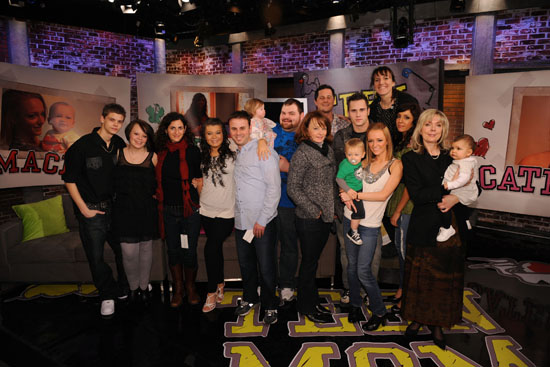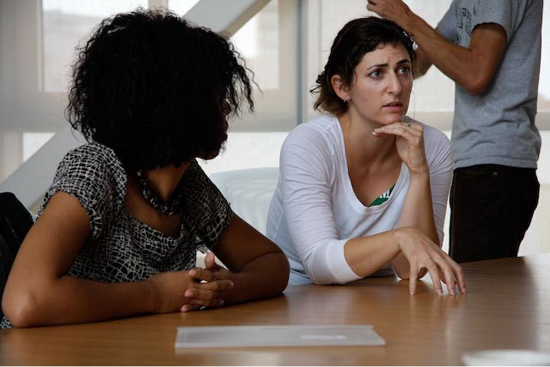MTV’s 16 & Pregnant and Teen Mom Producer Speaks at COM Tonight
Dia Sokol-Savage will screen documentary-style shows

Dia Sokol-Savage (third from left) alongside the cast of Teen Mom. Photo courtesy of Sokol-Savage
When MTV’s reality show 16 and Pregnant debuted in 2009, critics wondered if the documentary-style series would effectively capture the hardships of life as a teenage mother, or whether it might encourage some girls to get pregnant on purpose in the hopes of becoming famous.
But a study released last January by the National Bureau of Economic Research showed that those fears were largely unfounded. The report linked 16 and Pregnant to a 5.7 percent decrease in teen births in the 18 months after the show premiered. Researchers from the University of Maryland monitored Nielsen ratings, Google searches, and Twitter mentions about the show when new episodes aired. During each broadcast, they saw an increase in online searches pertaining to birth control and abortion. They also found that locations with higher search activity and tweets about 16 and Pregnant had increased searches and tweets about birth control and abortion. Finally, the researchers confirmed that high viewership in certain geographical areas corresponded with a larger drop in teen births there.
A popular show for the network (it beat out Olympics coverage in 2010), 16 and Pregnant follows pregnant teenagers, many of whom are poor, as they navigate first-time motherhood. Many storylines revolve around the young women’s relationships with the babies’ fathers, whether or not to stay in school, and how they balance raising children while maintaining an active social life.
The study’s findings were a validation for executive producer, Dia Sokol-Savage, who also produces the MTV spin-offs Teen Mom and Teen Mom 2. “That’s all you hope to do with a show like this—have a positive impact,” she says. “Especially for a show that garners the opposite opinion, where people say that we glorify teen pregnancy.”
Sokol-Savage will be on campus tonight to talk about and screen clips from 16 and Pregnant and Teen Mom as part of the Cinematheque series, a College of Communication program that brings accomplished filmmakers and producers to campus to screen and discuss their work.
Before joining MTV, Sokol-Savage, a Smith College graduate, produced and directed television shows such as ABC’s Wife Swap and Bravo’s Queer Eye for the Straight Guy, and worked alongside directors Errol Morris (as a production manager on his Oscar-winning documentary, The Fog of War) and Andrew Bujalski (as an actress for his first film, Funny Ha Ha, and as a producer on his next film, Mutual Appreciation).
Sokol-Savage, who was nominated for a 2010 Independent Spirit Award for producing Bujalski’s film Beeswax, about a pair of twins, spoke with BU Today about the early days of the shows, the behind-the-scenes work that goes into reality TV, and what it’s like to work as a producer for a major network.
BU Today: How and when did you join 16 and Pregnant?
Sokol-Savage: I was an independent film producer and director, and my boyfriend saw a Facebook posting from Morgan J. Freeman [a director, not the Oscar-winning actor], that he was looking for a coproducer on an MTV show. I was finishing up a movie I had directed, called Sorry Fix, and I went in and met him, and I think I got the job the next day. Two days later we were on our way to the first shoot for 16 and Pregnant.
The first mom I met was Amber Portwood, who is from Indiana. She went on to be on Teen Mom, and ended up getting a five-year jail sentence. She is now out of prison and doing really well. We are filming with her again for a new series where we are bringing back the original teen moms.
Did you think the idea to follow first-time teenage mothers was crazy? Was there anything else like it on TV at the time?
I loved the idea of it, but I was not convinced anyone would watch it. I thought it was a cool opportunity to make documentaries about an interesting issue affecting teenagers that no one was talking about, but I didn’t think it would garner a huge audience. That was my gut reaction. I knew there would be challenges as to how we would produce it, how you get people to be on a show called 16 and Pregnant.
What does your role as producer on the show entail?
It’s really changed over the years. When we started, we were a really small team, so my job was to do everything. We went out in the field, figured out where the cameras were going to go, shot if we had to, talked to the cast, and cleared locations. As the show grew and spawned the spin-offs Teen Mom, Teen Mom 2, and Teen Mom 3, it has evolved. We still have close relationships with the cast members but we also have large teams that we manage. So some of the job is network liaising, some of it is working with our field and story producers to figure out what stories are going on and what we are going to track. And sometimes it’s talking to the cast and going through any issues that come up. We’re always trying to bring things back to the central core of being truthful to what is going on in their lives.
Since it is a reality show, are you with the girls constantly?
We have a lot of different teams that go out at different times, but we are not embedded like some shows that track their stories over large periods of time. It’s a little different for 16 and Pregnant and Teen Mom. It often depends on what they have going on, but we’re often out there once every two weeks for three or four days.

Is it hard for these young women to get used to having a camera follow their every move?
The young women who are now starring in Teen Mom have had this as part of their lives for five or six years, so they are pretty accustomed to living their lives in front of the camera. But the task of an unscripted producer is to get people comfortable and help them forget about the cameras and just be who they are. And then we capture those moments.
How do you do that?
I think people have different approaches. One thing you do is shoot a ton of stuff, so much so that it hits the point where they forget about it. You’re shooting banal things and you’re watching them tie their shoes, eat cookies, and brush their teeth, so that when big moments of drama happen, the camera just becomes part of that backdrop.
The other thing you do is you make them part of the process. There is a lot of conversation when the cameras are rolling and not rolling about what is going on, why we are doing certain things, just making sure people feel comfortable with who is there, who’s in the house. It takes a lot of openness to let people be in your house—the sound crew, the lighting crew—so a lot of that is achieved by making sure everyone is comfortable and friendly.
How did the decision come about to create the spin-off Teen Mom?
We had just completed 16 and Pregnant, and it became clear that there was still a lot more to tell about these girls’ lives, beginning with the first few months of motherhood. So that was a conversation between myself, my coproducer, Morgan J. Freeman, and the executives at MTV. They let us keep doing it, let us go out and prove that concept.
Do you have a favorite story line or a particular mom that you’ve pulled for?
That’s a hard question. I’m pulling for everyone. We have such an intimate relationship with these girls for so long. Even the girls that people might think less of, or be more judgmental about, or not relate to as much….I’ve known most of these girls since they were young teenagers, at the most vulnerable point in their lives, so I have a huge affection for all of them. Sometimes it’s really hard to watch them go through their struggles, so I’m obviously always pulling for them.
The National Bureau of Economic Research study must have been good news for your show. What was your reaction when you heard about the results?
I was really relieved. It was validating, because for years we were told by experts in the field and laypeople that the shows are an incredible tool that helps them talk about birth control and pregnancy prevention with parents and teenagers in a way that nothing else has been able to do. The show can go places that sex ed in schools can’t, and it opens up the conversation in ways that feel really comfortable for people. So we’ve been told that, but having research and statistics that back that up was thrilling and validating.
What do you say to critics who argue that these shows do glorify teen pregnancy?
When I’m able to sit down and have conversations with those people, I feel like they aren’t watching the shows. I don’t think the shows glorify teen pregnancy. I think the complaints come more about the tabloids that are plastering these girls’ faces across magazines, and I don’t have any control over that. I think the shows consistently send a message of the hardships that are incumbent with having a kid when you are too young.
Why do you think the shows resonate with viewers?
I think it’s primarily because of how relatable the girls’ lives are across the board, whether or not you are a pregnant teen. There are far fewer pregnant teens out there than there are non-pregnant teens, but I think it’s just that people see their lives reflected in some way. It could be as simple as ‘that girl’s mom acts like my mom’ or ‘I was in a relationship like that.’ I think there are all types of ways that the shows connect with people, and it’s effective because you see yourself reflected even though they might be going through something that you have never experienced.
I also think we tell really good stories, and you want to keep watching because you want to know what happens next. There are exciting moments, but then there are stories where you watch because you want to know if people can pull through.
What’s your advice for television and film students who are trying to break into those fields?
I think across the board, whether you are trying to break into documentaries, fiction films, or television, it really is true that whatever job you’re in, no matter how entry-level it is, if you keep your eyes open and try to absorb and learn as much as possible, and work as hard as you can, and connect and make a good impression on as many people as possible, it really opens up doors. I see that work all the time on our shows. I have people who started as interns and are now editors and field producers. I have people who are show runners who came up through the ranks. All of that is about having a great attitude, being humble and hard working.
Dia Sokol-Savage will discuss and screen clips from 16 and Pregnant and Teen Mom 2 tonight, Friday, November 14, at 7 p.m., at the College of Communication, Room 101, 640 Commonwealth Ave. The event, part of the BU Cinematheque series, is free and open to the public.

Comments & Discussion
Boston University moderates comments to facilitate an informed, substantive, civil conversation. Abusive, profane, self-promotional, misleading, incoherent or off-topic comments will be rejected. Moderators are staffed during regular business hours (EST) and can only accept comments written in English. Statistics or facts must include a citation or a link to the citation.